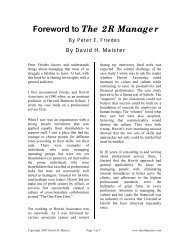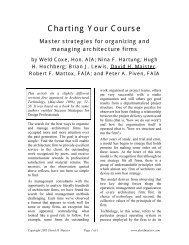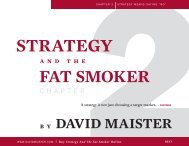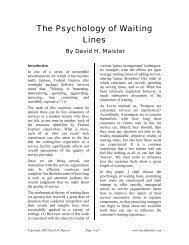pdf version - David Maister
pdf version - David Maister
pdf version - David Maister
Create successful ePaper yourself
Turn your PDF publications into a flip-book with our unique Google optimized e-Paper software.
Creating Value Through People<br />
everyone’s smart! Everyone knows what<br />
needs to be done.<br />
If this is so, then what is competition<br />
really about? It’s about who can best<br />
complete the work that needs to get<br />
done. And this in turn is determined by<br />
the following set of closely related<br />
concepts:<br />
• energy<br />
• drive<br />
• enthusiasm<br />
• excitement<br />
• commitment<br />
• passion<br />
• ambition<br />
Where these exist the discipline can be<br />
found to engage in diligent execution<br />
and thereby outperform the competition.<br />
The role of the manager is to be a net<br />
creator of enthusiasm, excitement,<br />
passion, and ambition. Alas, all too often<br />
managers are destroyers of excitement.<br />
If all they ever talk about is finances<br />
(How are your billings? What’s<br />
happening to receivables?), it can deaden<br />
the spirit.<br />
That doesn’t mean they don’t need to<br />
talk about these things—they do. But<br />
they shouldn’t talk only about these<br />
things. It’s the manager’s job to inspire,<br />
cajole, exhort, nag, support, critique,<br />
praise, encourage, confront, and comfort,<br />
as individual people (and groups of<br />
people) struggle to live their work lives<br />
according to high standards.<br />
All strategies, at some time or the other,<br />
involve a tradeoff between short-term<br />
cash and executing the strategy. If<br />
you’re going to get the benefits of a<br />
strategy, you need to be willing to make<br />
hard choices and act as if you truly<br />
believe it. You must be willing to<br />
practice what you preach, both when it’s<br />
convenient and, most important, when it<br />
is not.<br />
Many people don’t believe that their<br />
leaders truly want them to act<br />
strategically. Whenever a choice needs<br />
to be made between strategy and shortterm<br />
cash—and it always does—most<br />
people feel under significant, if not<br />
irresistible, pressure from management<br />
to go for the cash. Usually the message<br />
from the firm’s leadership is clear:<br />
strategy can wait for tomorrow (if we<br />
can get paid for competence, why strive<br />
for excellence?). Rather than leaders<br />
being a source of encouragement to<br />
execute the strategy, they’re all too often<br />
the biggest obstacles to the<br />
implementation of strategy.<br />
If you want to be known as excellent at<br />
something, you have to be reliably,<br />
consistently excellent at it. Business life<br />
is filled with daily temptations, shortterm<br />
expediencies, and wonderful<br />
excuses for why we can’t afford to stick<br />
to high standards today. We take in work<br />
that’s off-strategy (after all, it’s cash!),<br />
we defer training until some more<br />
convenient time (often never), we<br />
postpone investments until the everescalating<br />
profit goals are met, and the<br />
marketing principle is: we never met a<br />
dollar of revenue we didn’t like!<br />
There is nothing inherently wrong about<br />
making these choices, but you shouldn’t<br />
fool yourself. If you’re willing to<br />
sacrifice value to earn short-term cash,<br />
you won’t create a market reputation for<br />
superior quality. It takes courage to<br />
believe that a reputation for excellence is<br />
worth more in the long run than<br />
incremental cash. In their vision,<br />
mission, and strategy documents, firms<br />
Copyright 2005 <strong>David</strong> H. <strong>Maister</strong> Page 2 of 2 www.davidmaister.com











